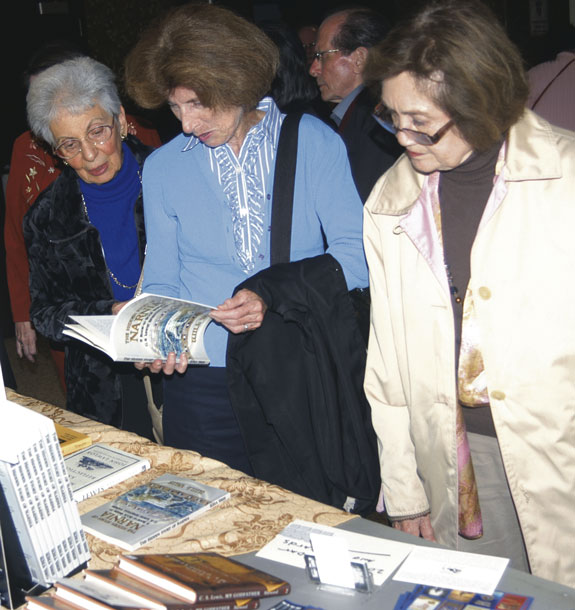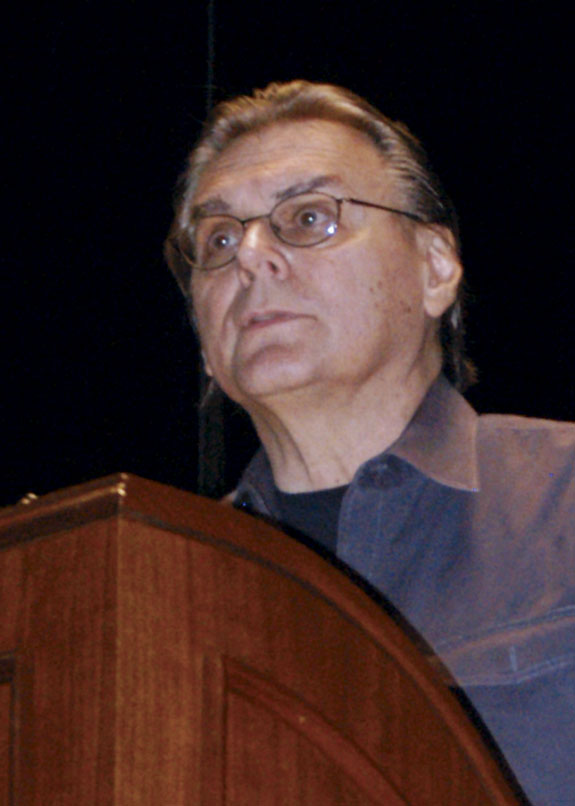by Antonina Zielinska

Fifty years ago on Nov. 22, the same day as President John F. Kennedy was assassinated, C.S. Lewis collapsed in his Oxford home and died.
Back then, the nation was in too much of a shock to pay much attention to his death, said Ed Wilkinson, editor of The Tablet. Nonetheless, he said, Clive Staples Lewis was a man who left a legacy well worth honoring.
“We didn’t want a milestone like this to pass without doing something,” the editor said.
Continuing its biannual forum series, The Tablet explored Lewis’ life and works Nov. 1 by inviting The Tablet readers to Christ the King R.H.S., Middle Village, for a documentary screening and talk. “The Life and Faith of C.S. Lewis, The Magic Never Ends,” directed by Chip Duncan was the featured documentary.
James Como, a professor at CUNY’s York College in Jamaica, was the guest speaker.
Death Overshadowed
The anniversary of Lewis’ death “will once again be over shadowed by the assassination, as it should,” he said.
Como said he remembers Nov. 22, 1963 clearly. He remembers the horror and uncertainty of the president’s assassination and how the nation was overcome with grief and shock. Later that night, he remembers coming home to read the paper. As he flipped the pages, he read about the death of C.S. Lewis in England.
Since then, Como has joined the New York C.S. Lewis Society and has written three books about the English author. He started his talk by reciting a whole list of reasons why C.S. Lewis was important. The list included his literature that withstood the test of time, the diversity of the genre of his work and his story of conversion from atheism to theism to Christianity.
“His life and his work is a story of transformation,” said Father Frank Mann, coordinator of The Tablet Forum series. “Stories of transformation inspire people because they show us their footprints.”
The documentary Father Mann chose for this forum introduced the laureate with one of his own quotes. Lewis described his atheism through the lens of a believer: “I was at that time living like many atheists; in a whirl of contradictions. I maintained that God did not exist. I was also very angry with God for not existing. I was equally angry with him for creating a world.”
Adan Riess, 15, who came to the event with his parents and friends, said that although he enjoyed reading Lewis’ “The Chronicles of Narnia” and “Out of the Silent Planet,” he did not know much about C.S. Lewis’ early life. The forum gave Riess a new perspective on the author.
“It shows how his work is a journey,” he said, adding that he looks forward to reading “The Screwtape Letters,” which is his friend’s favorite C.S. Lewis work.
His friend, Bernadette Guther, 13, who was also in attendance, said she enjoyed the humor of the book of letters – a fictitious correspondence between a senior demon and his nephew on how to tempt humans.
Riess’ parents, Kari and John, said they encourage their children to read the books.
“It’s obviously great children’s literature,” John said, adding that the character development in the children protagonists is a good example for readers of any age.
“It’s not hitting them over the head” with morality lessons, Kari said. “It seeps in and nourishes them with goodness.”
Eleven-year-old Ellen Tuffy said she read “The Lion, the Witch and the Wardrobe” about five times.
“I never get tired of it,” she said. “It’s a really nice book.”
Tuffy, who visited Lewis’ grave and the pub, The Eagle and Child, he frequented with his friends, said she now looks forward to reading some of the author’s science fiction works.
Stephanie Aliberti, who lives in Astoria, said she saw an ad for the forum in The Tablet and decided to bring her daughter because she knew Christine is “a big fan.”
“It was such an interesting film about his life,” Stephanie said, who was unaware of the writer’s family life and military service during World War I. “I only knew C.S. Lewis through my daughter. Now I want to read his work for myself.”
Christine, who lives in new Jersey, said she enjoyed the forum and learning more about Lewis’ life. Besides reading his books, she gets her daily Lewis fix via the CSLewisDaily feed on Twitter.
Complex Faith Journey

Deacon Chris and Melissa Wagner from St. Bernard parish, Mill Basin, were also among the forum attendees. Melissa has not only enjoyed reading several of Lewis’ books, including “The Screwtape Letters,” “The Great Divorce” and “The Four Loves,” but also feels she can relate to his complex faith journey.
“I find it interesting that he was an atheist,” she said. “He described his conversion as a gust of wind. As a person who also found my faith a little later in life, I always question my worthiness of God’s gift (of faith).”
Forum-goer Eileen Fitzgerald of St. Sebastian parish, Woodside, said she “has always loved C.S. Lewis” as well as J.R.R. Tolkien and G.K. Chesterton, both of whom were mentioned in the film.
Like Wagner, she is also fascinated by “his journey from atheism to Christianity. He shared with us his search for truth and the joy in reaching it.”
Fitzgerald clarified that Lewis was a Christian, but not a Catholic, for one of her fellow forum-goers. She wondered if he had lived longer whether he would have become a Catholic.
The Rooney family from Flushing proved the intergenerational appeal of the writer and Christian apologist. David and Mary, parishioners at Holy Family Church, attended with their five children, ranging from elementary to college age. All are fans of “The Chronicles of Narnia” and decided to make the forum a family event.[hr]
Contributing to this article was Marie Elena Giossi.
